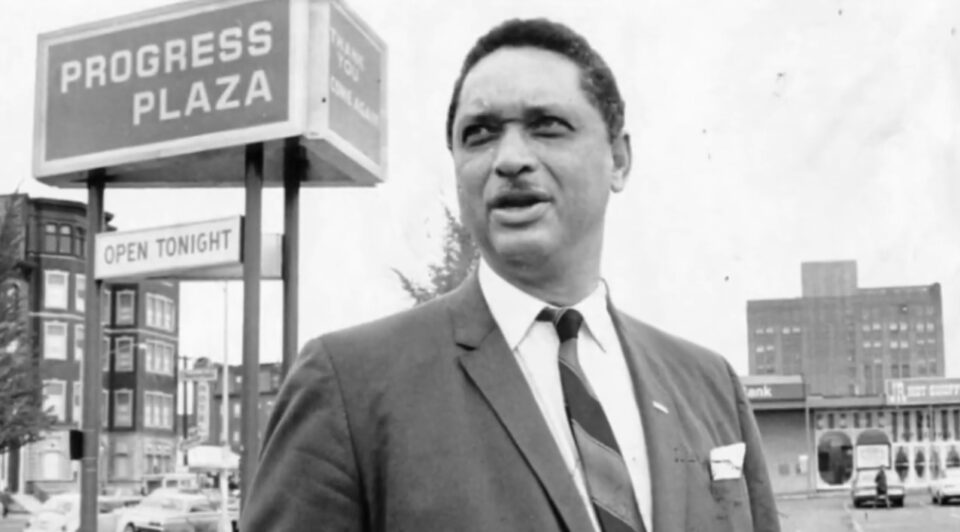
February 25, 2023
A Man of Courage: Leon Sullivan, First Black Corporate Director Who Fought Against Inequality and Apartheid
The late Rev. Leon Sullivan, founder of Philadelphia-based Opportunities Industrialization Center and first Black corporate director when he was appointed to General Motors’ board in 1971, was transformative. He was among the first wave of Black directors to fiercely advocate for equality and supplier diversity.
Today, Sullivan’s legacy remains a model for Black activism in corporate governance. His tireless fight against inequality and apartheid proves just how vital it is for African Americans to hold a seat on the board of a major publicly traded corporation. As a pioneer, he made winning efforts towards economic emancipation.
Listed on BLACK ENTERPRISE‘s Registry of Corporate Directors –our listing of Black board members from the 250 largest companies on the S&P 500– the West Virginia native believed that jobs were the key to the economic development and true empowerment of African Americans.

Philadelphia OIC
A champion for equality and civil rights
From the pulpit, Sullivan could clearly see the needs of his community. From redlining policies to urban decay, he witnessed thousands unemployed, but thousands of jobs were vacant. So he made courageous moves against equal employment practices amidst a raging Civil Rights struggle and at the dawn of both the Black Power era and then-President Lyndon Johnson’s War on Poverty.
Often referred to as the “Lion from Zion,” Sullivan fought for equitable contracting arrangements for minority suppliers and urging corporations to divest from South Africa under apartheid, the policy of racial discrimination against the nonwhite majority in the Republic of South Africa from 1948 to 1994.

Philadelphia OIC
During this time period, from 1959 to 1963, the respected civil rights leader convened local Black preachers to organize “selective patronage” boycotts of local companies, including Tasty Baking, Sun Oil, Gulf. With the slogan “Don’t buy where you don’t work,” Sullivan drew national attention leading the charge of urging Black consumers to protest against those companies who were deemed to discriminate against African Americans in their hiring.
As a result, several thousands of employment opportunities were accessible to Black workers. The late civil rights titan Martin Luther King Jr even adopted Sullivan’s techniques in his Southern Christian Leadership Conference’s (SCLC) Operation Breadbasket to use the power of black ministers and the organizing strength of the churches to create economic opportunities in Black communities.

Philadelphia OIC
For 40 years, the longtime pastor of North Philly’s Zion Baptist Church sought ways to use his pulpit to organize for local African-American causes, particularly in employment.
In 1964, Sullivan founded the first Black-run program of its kind, Opportunity Industrial Center, a job-service training program to teach life skills to Black Philadelphians and then matched its graduates up with the employment needs of Philadelphia businesses. Under the philosophical banner of “Helping People Help Themselves”, OIC still operates today, in over two dozen states and around the globe, moving people from welfare to work, from tax dependent to tax payer and from homelessness to homeownership for over 50 years.

Philadelphia OIC
Sullivan’s next proposal to tackling job discrimination is the establishment of Progress Plaza to help Black business owners succeed by giving them a prominent location to place their businesses and create new jobs. The Plaza became the first shopping center in the United States to be developed, owned, and managed entirely by African Americans.
In funding this project, Sullivan implemented the “10-36 Plan” in which 50 members of his congregation donated $10 per month for 36 months. He went onto to launch Zion Investment Associates, which became Progress Investment Associates (PIA), and later broke ground for a $2 million shopping center with a 20-year, million-dollar lease with the A&P food store chain.
The Sullivan principles
Having fought for equal employment opportunities for African Americans, Sullivan hoped that that companies would use their privileged position to lobby for political change. The Sullivan principles were born out of an international campaign to reform apartheid.

Philadelphia OIC
By 1977, Sullivan leveraged his seat at the table to develop and propose a set of six principles, dubbed the Sullivan Principles. This corporate code of conduct was used to govern U.S. investments and business operations in South Africa by promoting equal opportunity, education and human rights.
From the elimination of workplace discrimination to sponsoring social programs and community investment, the effective Sullivan Principles was formally adopted years later by more than 125 corporations, which shut down operations and divested holdings associated with South Africa.

Philadelphia OIC
Achievements for a lifetime of work
In 1987, Sullivan was bestowed with the Franklin D. Roosevelt Four Freedoms Medal for his efforts to eradicate apartheid in South Africa. In addition to holding honorary doctorate degrees from over 50 colleges and universities, he was also an awardee of the Presidential Medal of Freedom in 1992 by President George H. W. Bush, honoring him for his “voice of reason for over forty years.”

Philadelphia OIC
In 1991, Sullivan started the first African-African American Summit, blazing the path for generations of conferences and summits catered to uniting and celebrating achievements.